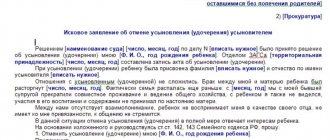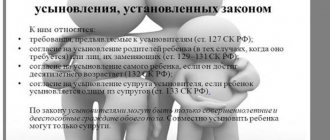Author of the article: Yulia Kaisina Last modified: January 2021 16512
Adoption is one of the ways to legally formalize the transfer of a child to a family. It is assumed that the new relationship will be permanent and the child will find new parents. However, sometimes it becomes necessary to cancel an adoption. The grounds for such a step are provided for in Art. 141 RF IC. Cancellation of adoption is carried out in the interests of the child and is partly similar to deprivation of parental rights. However, since the adoptive parents are not related by blood to the children, the procedure has additional nuances.
What is adoption?
Adoption is a procedure by which an unrelated adult and a child become legally a parent and a son/daughter.
You can adopt a child in cases where his parents:
- gave consent to adoption;
- died;
- deprived of parental rights (more than 6 months ago);
- unknown.
Adoption takes place in court. The adoptive parent and the adopted child receive the rights and responsibilities of a parent and a child from the moment the court decision enters into legal force.
The Mystery of Adoption
It is prohibited to disclose information about the fact of adoption, the circumstances under which it occurred, the identities of adoptive and biological parents and other data. The court's annulment of the adoption makes it possible for all this information to be disclosed. It is clear that even if the child was too young at the time of transfer to a foster family and does not remember it, it is impossible to hide the fact of adoption during the process of canceling it. However, in addition to the child, third parties have the opportunity to find out about this, and responsibility for transferring this data to them is canceled.
Grounds for cancellation of adoption
But a new family cannot always cope with the changes that arise. Therefore Art. 140 of the RF IC provides for the possibility of canceling an adoption if there are sufficient grounds for this.
The reason for canceling an adoption may be:
- Adoptive parents shirk their assigned responsibilities.
Evasion of responsibilities means neglect of the needs of the child (refusal of material support, treatment, provision of food, clothing, school supplies, violation of the right to education). A popular example of evasion of responsibilities is refusal to pay alimony during a divorce of adoptive parents. Malicious evasion can not only become a reason for cancellation of adoption, but also for criminal prosecution. Moreover, the obligation to pay alimony will continue after the adoption is cancelled. - Adoptive parents suffer from alcoholism or drug addiction.
Chronic alcoholism or drug addiction is grounds for deprivation of parental rights. But the adoptive parent cannot be deprived of parental rights. In such a situation, to protect children's rights, the adoption is canceled at the request of the prosecutor or the guardianship department. - The adoptive parents abuse the child.
This fact can be proven by a court verdict. If the adoptive parent is held liable for beatings or sexual violence, then the adoption must be canceled at the request of the district guardianship department. - At the initiative of the adoptive parent or adopted child.
If family relationships do not work out, then either party can initiate cancellation of the adoption. A child from 10 to 14 years old can contact the guardianship department so that they initiate the process on his behalf. From the age of 14 he can already be an independent plaintiff in the process. The reason for going to court may be the appearance of parents or other blood relatives of the child with whom he would like to live. Another reason may be a lack of mutual understanding in the family.
Note! If citizens adopt a child, and after the court decision enters into legal force, a disease is discovered about which they were not warned, then they can cancel the adoption. In this case, the adoption is considered terminated due to the fault of the guardianship department, not the family. Therefore, alimony is not collected from adoptive parents.
The list of reasons is not final. Each situation is considered by the court individually. If the court believes that the rights of the child in the adoptive family are being violated, then it can make a positive decision in other cases.
The procedure for registering maternity capital when adopting a child
How to adopt a wife's child from her first marriage? Step by step order
Algorithm of actions
The procedure for revoking an adoption varies slightly depending on the initiator. However, as a general rule, cancellation is possible in the following stages:
- Collection of documents.
- Filing a claim.
- Referral to court.
- Trial.
- Making a decision.
- Reporting information to the registry office.
Collection of documents
The list of documents for cancellation of adoption depends on the reasons for initiating the process. However, the general list is the same for all plaintiffs:
- passport;
- child's birth certificate;
- child’s civil passport (if available);
- adoption certificate;
- extract from the place of registration of the child;
- grounds for cancellation of adoption.
Additional documentation:
- a court verdict to hold the adoptive parent accountable for a crime against a child, a second adoptive parent or close relatives;
- administrative decisions on bringing to responsibility under Art. 5.35 Code of Administrative Offenses of the Russian Federation (for improper performance of duties);
- information from the child’s place of study;
- information about the health status of the adoptive parent (if the cancellation is made at the initiative of the adoptive parent due to health status);
- the result of a psychological examination about negative relationships in the family.
If the process is initiated in the interests of a minor, at the request of the child, then correction of the parent-child relationship will be required. If, as a result of the support, the conflict in the family is not resolved, the prosecutor’s office or the guardianship department must go to court on behalf of the child.
If the process is initiated by the adoptive parent, then he has the right to refuse crisis support for the family. To do this, you need to write a statement of refusal to the guardianship department at your place of residence.
Statement of claim
An application to the court must be made in writing. The document is subject to the usual requirements for a claim (Article 131 of the Code of Civil Procedure of the Russian Federation).
A claim to revoke an adoption must include:
- name of the judicial authority;
- applicant details;
- information about the defendant;
- name of the guardianship department;
- data from the district prosecutor's office;
- name of the claim;
- information about the adoption process (date, court decision data);
- information about the child;
- the reasons that led to the process;
- reference to law;
- demands for cancellation of adoption;
- list of documentation;
- date and signature.
Sample claim for cancellation of adoption
In addition to the basic requirement, the document may contain additional:
- on the collection of alimony;
- about maintaining or changing your full name. child to the original ones;
- on the transfer of a minor to the care (guardianship department, second adoptive parent, blood parents).
Important! The defendant in the process is the adoptive parents. However, the law provides for the possibility of canceling the rights and obligations of only one of them. In such a situation, the second completely retains its status.
If the plaintiffs are the adoptive parents, then the child is named as the defendant. This is possible if the cancellation is made due to the lack of contact between the adoptive parents and the minor (clause 20 of the Resolution of the Plenum of the Armed Forces of the Russian Federation of 2006 No. 8).
Trial
The initiator of the process must prove the existence of conditions for the annulment of the adoption. Witnesses can be brought in as evidence. For example, if the defendants perform their duties improperly.
A prerequisite is the participation in the judicial proceedings of a specialist from the guardianship department and a prosecutor. The opinion of a child aged 10 years or older is also heard.
The procedure for canceling adoption in court
The procedure for canceling an adoption includes the following procedure:
- Preparation of documents.
- Drawing up a statement of claim.
- Payment of state duty.
- Going to court.
- Obtaining a court decision.
After the court decision enters into legal force, the court independently transmits the information to the registry office. Therefore, it is not necessary for the former adoptive parent to visit the registry office. But you need to contact the Federal Migration Service office in order to reset the entry about the child in the passport based on the court decision.
Preparation of documents
Before going to court, you must prepare the following documents:
- passport;
- receipt of payment of state duty;
- child's birth certificate;
- court decision on adoption;
- passport of a child over 14 years of age;
- characteristics of a child from an educational institution;
- an extract from the passport office about the place of registration of the child.
In addition, it is necessary to prepare documents that confirm the grounds for canceling the adoption. Among them:
- court verdict – in case of cruel treatment;
- medical documents - if the adoptive parent is registered at a drug treatment center for alcohol and drug addiction;
- medical documentation for the adoptive parent or adopted child - if the adoptive parent abandons the child for health reasons.
If the initiator of the cancellation is the adoptive parent, then in order to save the family, the guardianship department will offer crisis support. But the adoptive parents have the right to refuse it.
Drawing up a statement of claim
The statement of claim must include the following information:
- the name of the district court at the place of registration of the adoptive parent and the adopted child;
- plaintiff's details;
- information about the defendant;
- third parties (guardianship department, prosecutor's office, civil registry department specialists);
- name of the claim;
- information about the adoption process;
- child details (full name, age);
- information about the circumstances that led to the cancellation of the adoption;
- reference to the law (Articles 140 – 143 of the RF IC);
- claim;
- list of attached documents;
- date and signature.
Sample claim
If the plaintiff is the adoptive parent, then the child is named as the defendant.
Payment of state duty
Payment of the state fee to the court when canceling an adoption has a number of nuances:
- If the claim is initiated by the guardianship department in order to protect the interests of a minor, then the state fee is not paid. 300 rubles are recovered from the defendant.
- If the initiator of the claim is a minor, then the state duty is also not paid. 300 rubles are withheld from adoptive parents.
- If the initiator of the process is the adoptive parent, then when submitting the application he must pay 300 rubles.
Additional expenses include the cost of a lawyer - from 10,000 rubles, printing of documents, postage when sending documents to the court and other parties to the process - from 600 rubles.
Going to court
The adoptive parent can submit documents:
- Personally. To do this, you need to visit the district court at your place of registration or at the place of registration of your child (if registered in different places). In this case, it is necessary to provide the court office with notifications from the post office that other copies of the claim have been sent to the defendant and third parties.
- By mail. In this case, a copy of the claim and court attachments, an inventory of the contents and postal receipts must be included in the envelope for the court.
- Through the GAS Justice portal. To do this, you need to have a confirmed personal account on the State Services website and a qualified electronic enhanced signature.
Obtaining a court decision
If the court has satisfied the plaintiff's demands, then it is necessary to obtain a decision. The document will come into force 30 days from the date of issue.
From this moment on, mutual rights and obligations between the adoptive parent and the adopted child cease. You can obtain a court decision at the court office.
Information about the cancellation of adoption is transmitted by the court to the district guardianship department and the district registry office. Specialists of the guardianship department enter data on the cancellation of adoption due to the fault of the adoptive parent into the regional data bank. After this, he will never again be able to become an adoptive parent, guardian or foster parent.
Specialists from the Civil Registry Office make changes to the child’s birth certificate. The blood parents are again entered into the mother and father columns, the child receives the same surname (if such a condition is included in the court decision). The date of birth of the child also changes (if the adoptive parents changed it).
Arbitrage practice
It is necessary to distinguish the invalidation of an adoption from the cancellation of an adoption. This is possible when a “fictitious adoption” takes place. That is, the goal of the parties or one of them is not to create a family, but to receive some benefits.
As a rule, fictitious adoption is formalized in the following cases:
- to receive benefits or maternity capital;
- to register as a family in need of improved housing conditions;
- to receive regional payments for adoptive parents;
- to claim the citizenship of an adopted child;
- to receive a deferment from the army.
Until the 80s of the last century, fictitious adoption was formalized mainly to obtain free labor. Adolescent children were accepted into the family from orphanages. This practice has now become obsolete.
In 2021, a popular reason for canceling an adoption is the re-adoption of the children of a former spouse and abandonment of the child in the event of a divorce of the adoptive parents.
Adoption statistics in Russia
The number of children without parental care identified during the year is decreasing every year. According to the data, 58,168 children were identified in 2015, which is 5.6% less than in 2014.
The number of children registered in the state data bank on children left without parental care, by age at the beginning of 2021
Legal consequences
From the moment the court decision to cancel the adoption enters into legal force, the mutual rights and obligations of the parties cease.
Consequences for the child:
- loses the right to inherit by law from the adoptive parents;
- loses the right to reside in the adoptive parents’ apartment;
- loses the right to alimony (if the cancellation of adoption is not the fault of the adoptive parents);
- information about biological parents is returned to the birth record;
- a new birth certificate is issued, where the biological mother and father are indicated as the parents;
- loses family ties with adoptive parents and their relatives;
If the adoption was canceled due to the fault of the adoptive parents, then the court collects alimony from them in favor of the child until he comes of age.
Separately, it is necessary to consider the situation with the name of the adoptive parents. During the adoption process, the child receives the surname of the new family. And during the cancellation process, he can refuse it if he is 10 years old. You cannot change a child's last name without his consent.
| But the child retains the rights to | The adoptive parent loses the following rights |
|
|
But, if the adoptive parent was the culprit in canceling the adoption, then he receives the obligation to pay alimony.
Is it possible to cancel?
In accordance with Art. 140 of the RF IC, adoption may be canceled by a court decision. A citizen cannot independently abandon a child. The issue is resolved exclusively through the courts.
Not only the adoptive parent can initiate the process. In case of improper performance of duties, de-adoption is possible on the initiative of the prosecutor's office or the guardianship department.
Expert opinion
Stanislav Evseev
Lawyer. Experience 12 years. Specialization: civil, family, inheritance law.
In accordance with the law, the guardianship department is obliged to monitor the families of adoptive parents. The control method is visiting families at their place of residence. If facts of child abuse or other violation of children's rights are revealed, the guardianship department independently initiates the process or transfers the data to the prosecutor's office.
In such a situation, the cancellation of adoption is analogous to the deprivation of parental rights. Therefore, someone else’s child can be removed on the same grounds (cruelty, refusal to pay child support).
On the other hand, the measure is similar to challenging paternity. Information about the adoptive parents is removed from the child’s documents. He receives his original full name. and date of birth.
Important! If a minor has reached 10 years of age, changing personal data is possible only with his consent.
The adoption is considered canceled from the moment the court decision enters into legal force. The adoptive parent retains the responsibility to provide financial support for the child.
The court is obliged to notify the civil registry office of the decision within 3 days. The civil registry office specialist must make appropriate changes to the children's documents.
The child's legal representative must obtain a new birth certificate. Information about adoptive parents will be removed from the columns about parents. Instead, information about the birth mother and father will be entered.
Is it possible to cancel the adoption of a wife's child during a divorce?
In a marriage, a man often adopts his wife’s child from a previous marriage. And during a divorce, he tries to cancel the adoption so that the child cannot subsequently claim his property.
However, the courts have a negative attitude towards such demands and may leave the claim without consideration.
Example. Citizen R. filed a lawsuit to cancel the adoption. He explained that during marriage he adopted his wife’s son from his first marriage. During their marriage, they had another son. The marriage is now over. He pays child support for two children and has no objection to keeping them. But he doesn’t want his wife’s son to have a claim on his property. The guardianship department and the prosecutor's office opposed meeting the requirements. The teacher at the school where the child is studying and the mother said that the child is attached to the adoptive parent. Therefore, the court refused to satisfy the demands (Decision of the Chernushinsky District Court of the Perm Territory dated November 2, 2015 in case No. 2-1123/2015).
Persons entitled to initiate cancellation
The list of those persons who can demand the cancellation of the adoption of a child is determined by the provisions of Art. 142 RF IC. It includes, in particular:
- biological parents of the child;
- the adoptive parents themselves or one of them;
- adopted person who has reached the age of 14;
- guardianship authorities that have identified violations of the rights of the child;
- prosecutor.
It follows from this norm that only interested parties can initiate cancellation. In this case, persons who have the right to demand the cancellation of adoption may be guided by both personal and state interests, if this directly follows from the powers vested in them.
For example, the guardianship authorities or the prosecutor are vested with this right in order to protect the interests of the child if the annulment of the adoption is necessary due to the guilty actions of the adoptive parents. Biological parents may also be guided by similar motives - canceling the adoption in their personal interests is impossible.
An adopted child has the right to demand cancellation of adoption upon reaching 14 years of age, that is, it is from this age that the legislator gives him procedural capacity. However, both before reaching this age and after, a child’s independent appeal to the court seems problematic, since, regardless of age, it is easier for a child to communicate his desire to the guardianship authorities.
Other interested parties (relatives of the child, spouses of adoptive parents, public organizations) who do not have procedural rights to initiate annulment of adoption, but who have reliable information about violations of the rights of minor adoptees, have the right to do the same.
Separately, it should be noted those who will act as defendants in this category of cases. In most cases, they are the adoptive parents, since it is their actions that are the reason for the initiation of the process. If the initiators are the adoptive parents themselves, the defendant will be the adopted child, whose interests must be represented by the guardianship authorities.
When is cancellation not allowed?
The court does not always satisfy the requirements if the initiator of the process is the adoptive parent. If the specialists of the guardianship department, the prosecutor's office and the child are against the cancellation, then the court may leave the statement of claim without consideration.
In accordance with Art. 144 of the RF IC, cancellation of adoption in general is not allowed if the child is over 18 years old.
You can get around the ban by obtaining the consent of the adopted child, the adoptive parents and the child’s blood parents. Moreover, you can do without the consent of your parents. For example, if they died, were deprived of parental rights, or were declared incompetent by a court.
Is it possible to abandon an adopted child?
Life is full of situations when adopted children, despite the legal registration of family ties, never become family. This is especially true in cases where adoption is carried out by a stepfather or stepmother - the spouse of the child's natural parent, although other categories of adoptive parents are also not immune from problems with the adopted child.
Without having sincere feelings for the child, candidates for adoption motivate their actions with the desire to please their spouse. When the relationship with him is severed, the question arises whether it is possible to abandon the adopted child after a divorce from the ex-spouse, because any ties with him will not be maintained.
In cases where the relationship between the adoptive parents and the adopted children has not developed properly, it is possible to abandon the child by canceling the adoption.
In such a situation, both the adoptive parent and any other person interested in the cancellation are required to prove the existence of grounds that prevent the implementation of normal family relations between the parties to the adoption or the fact that their further course is contrary to the interests of the minor.
Regulatory framework
The adoption of an adopted child is carried out according to the rules and in the manner prescribed by family and civil procedural legislation. In particular, the format of the cancellation, the reasons why it can be made, the subjects, consequences, restrictions and other aspects of the cancellation of adoption are determined in accordance with the provisions of Art. Art. 140-144 RF IC. The procedure and principles for resolving such cases are determined in accordance with the provisions of Art. 275 Code of Civil Procedure of the Russian Federation.
Lawyer's answers to private questions
When I was 9 years old, my stepfather adopted me. Now I'm 21 years old. My stepfather died 3 years ago. Can I cancel my adoption?
No. After reaching the age of majority, cancellation of adoption is possible by mutual consent of the adopted person and the adoptive parent. If the stepfather has died, then the adoption cannot be canceled.
In '94 I adopted my wife's son. We divorced in 1999. I never saw the boy again and did not maintain a relationship with him. Can I cancel my adoption now?
Only if he agrees to cancel the adoption. We need to find him and find out his opinion.
He adopted his ex-wife's son. A daughter was born in the marriage. After the divorce, the ex-wife left with the children for another city and does not allow them to meet. A year ago I filed for alimony and arrears arose. Can I cancel my adoption and not pay child support?
Even if the adoption is cancelled, the court will retain the obligation to pay alimony until the child reaches adulthood.
How to refuse after adoption?
The initiator of the process must go to court. The application must be submitted to the district or city court at the child’s place of residence.
If there are grounds, a minor may be removed from the family in advance and placed in a rehabilitation center. He can continue to meet and communicate with adoptive parents if this does not violate his rights.
It is prohibited to initiate the process after the child has reached the age of majority. If he has reached 18 years of age, then the official connection between the adoptive parents and the adopted child will be maintained until the end of his life.
Often men want to give up after adopting their ex-wife’s stepchild. It must be remembered that the obligation to pay alimony will remain.
Arbitrage practice
Judicial practice in cases of this category and their legal analysis allow us to draw the obvious conclusion that such cases can be classified as rare. As follows from most judicial acts, in 60% of cases the initiators of the cancellation of adoption are the adoptive parents themselves. There are many reasons for this: lack of mutual understanding between the parties, adoptees living with relatives, refusal to accept adoptive parents as parents, and others. However, the court does not always agree with such arguments - in half of the cases such claims are rejected.
Another 30% of claims for cancellation are initiated by supervisory authorities who have identified a discrepancy between the living conditions of children and their interests. Considering the fact that such an appeal is preceded by thorough supervisory work that reveals obvious facts of violation of the rights of minors, such demands are almost always satisfied.
About 5% of cases are claims filed by the natural parents of children. They, as a rule, contain absurd arguments that are not taken into account by the court, as a result of which the requirements to cancel the adoption are not satisfied.
Is it possible to reverse a failed adoption if necessary? If yes, on what grounds?
The inability to give birth to their child is one of the most common reasons forcing desperate spouses to take in a minor and try to become his parents.
Adoption may be unsuccessful not only because of the child’s poor heredity or psychological incompatibility, but also for a host of other reasons, but not every reason for a failed relationship will be considered sufficient grounds for cancellation.
Art. 137 of the RF IC states that someone else’s child, officially recognized as one’s own, is equal in rights to his own children . If mother and father, relatives by birth, do not properly fulfill their parental responsibilities, then the court may deprive them of their parental rights.
In relation to adoptive parents who do not fulfill their parental duties and infringe on the rights of a minor, a different measure is taken at the legislative level - the adoption is cancelled. Cancellation of adoption is a legal procedure regulated by Art. 140-144 RF IC, Art. 275 Code of Civil Procedure of the Russian Federation.
As stated in Art. 140 of the RF IC, everything can be returned only in court with the participation of representatives of the guardianship and trusteeship authorities, as well as the prosecutor’s office. Proceedings require truly compelling reasons, with the interests and rights of the child being paramount.
The grounds for cancellation of adoption are most often as follows (Article 141 of the RF IC):
- parents shirk their duties or abuse their rights;
- the child is subjected to violence or abuse;
- adoptive parents suffer from chronic drug addiction or alcoholism.
Families who have assumed the responsibilities and rights of parents in relation to someone else’s child must constantly be under the close attention of the guardianship and trusteeship service so that they can respond in a timely manner to identified violations of the rights of a young child.
There are often cases when the adoptive parents are a stepfather or stepmother, who subsequently failed to overcome the negative attitude towards a biologically stepchild and allowed systematic physical or moral oppression of the minor stepson.
In such cases, the biological parent has the right to return everything back, depriving the step-parent of the minor son/daughter of the rights of an adoptive parent.
The court may recognize the following circumstances as sufficient grounds for canceling the adoption:
- due to a serious illness or injury of one of the family members, the new family is strapped for money and is unable to provide adequate care and support for another family member;
- the adoptive parent is listed as missing or declared incompetent by the court;
- the child is placed in special care. institution for permanent residence in the state. provision.
One of the grounds for such a procedure is recognition of the adoption as fictitious, i.e., committed for the sake of obtaining any material benefits. Having received what they wanted, such would-be parents do not strive to give someone else’s child everything they should - attention, care, upbringing, a good education, etc.
Proving that the procedure is fictitious is quite difficult, but possible. It is important to understand that legally this aspect is difficult to substantiate and collect documentary evidence.
The Supreme Court of the Russian Federation is also considering the following grounds:
- the relationship between the adoptive parent and the minor is so hostile and hostile that reconciliation and coexistence are impossible, as a result of which there is absolutely no point in adoption;
- the child is mentally disabled or suffers from a hereditary disease, but only if the adoptive parent was not informed about this.
Divorce is not grounds for canceling adoption: a minor child, as with the dissolution of any official marriage, will continue to live with one of the couple, and the other parent will be required to pay child support and participate in upbringing.
Cancellation of the adoption of a minor citizen of the Russian Federation taken by foreign nationals will be carried out in accordance with the laws of the country where the family lives. It also matters whether a treaty has been concluded with this country. The topic of cancellation of adoption is complex and not fully worked out by the RF IC, as a result of which a lot of nuances arise, the answers to which are almost impossible for a non-specialist.
In difficult situations, you need the help of a qualified lawyer specializing in family law, and, if necessary, in international family law.
○ Invalidation of adoption.
In the legislation of the USSR there was such a thing as invalidation of adoption, sometimes also called fictitious adoption .
Code on Marriage and Family of the RSFSR (hereinafter referred to as the Code of Marriage and Family of the RSFSR) in Art. 112 indicated that an adoption may be declared invalid “if the adoption is fictitious.” Although the law did not contain a definition of the concept of “fictitiousness,” in practice, fictitious adoption was understood as a situation where a child was adopted only and exclusively to receive any benefits or benefits from the state, the disposal of property inherited by the child, etc. in this case, as a rule, using forged documents. In this case, interested parties (more about them below) could demand through the court that the adoption be declared invalid.
It must be said that fictitious adoption was not such a rare thing, and the reasons for it could be the most unexpected. For example, quite often there was a situation where the adoption of a young child was carried out by a young man in order to... avoid military service or at least get a deferment.
At the moment, rules on precisely this method of terminating the relationship between an adopted person and an adoptive parent are contained in the legislation of a number of countries in the post-Soviet space (in particular, Ukraine, Belarus, Kazakhstan). In the Russian Federation itself, formally, the norms of the Code of Business Safety of the RSFSR can be applied by virtue of Part 1 of Art. 169 of the RF IC, according to which the norms of the RF IC apply only to relations that arose after the RF IC came into force, that is, from March 1, 1996.
Theoretically, it would be possible, if necessary, to invalidate adoptions completed before this date - this position was taken at one time by the Plenum of the Supreme Court of the Russian Federation in Resolution No. 8 of April 20, 2006.
However, here we are faced with another circumstance: the RF IC does not allow the cancellation of adoption for adult children (more details will be discussed below). It is easy to notice that now even children born exactly on March 1, 1996 are already over 18 years old. Consequently, the possibility of applying the norms of the Code of Labor Code of the RSFSR in this case is already a purely theoretical possibility and in practice no longer makes any sense.
[ ]
Grounds for the procedure for returning children
Article 141 of the RF IC strictly regulates the main grounds that make it possible to cancel an adoption:
- the adoptive parent began to take drugs (drugs, alcohol, etc.);
- the adoptive parent refuses to fulfill his duties and does not raise the adopted children;
- abuse of rights and cruelty to a child (use of child labor for one’s own benefit);
- incapacity or significant serious illness;
- the appearance of the baby’s blood (biological) parents, who were listed as missing, or who have undergone treatment for diseases (alcoholism, drug addiction) and want to restore their rights in relation to children;
- After the adoption, it turned out that the baby was seriously ill, and the adoptive parent was not informed.
In all of the above situations, the basis for cancellation is the incorrect and inappropriate attitude, as well as the behavior (or circumstances) of the adoptive parent towards the adopted child.
There may be significantly more reasons for cancellation. The court may revoke an adoption for a variety of other reasons. The court makes the decision to cancel, necessarily taking into account and guided by the interests of the child himself.
In the absence of a permanent income or its change to a lesser extent, the adoptive parent may be relieved of the responsibilities of raising the child.
If a family has a difficult relationship between the adopted children and the adoptive parent, the second one may also be deprived of his status.







